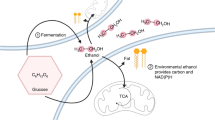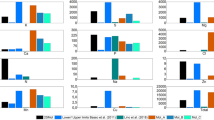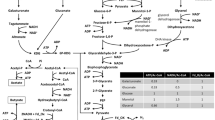Abstract
IT has been shown recently that the chief products of glucose fermentation by Chlorella vulgaris (Pearsall's strain) are acetic acid, lactic acid, hydrogen and a little carbon dioxide1. It was of interest to study the fermentation of glucose labelled with carbon-14 in particular carbon atoms since, from a determination of the distribution of carbon-14 in the molecules of the products, something can be learnt of the fermentation pathway.
This is a preview of subscription content, access via your institution
Access options
Subscribe to this journal
Receive 51 print issues and online access
$199.00 per year
only $3.90 per issue
Buy this article
- Purchase on Springer Link
- Instant access to full article PDF
Prices may be subject to local taxes which are calculated during checkout
Similar content being viewed by others
References
Wong, H. A., and Syrett, P. J. (in the press).
Bulen, W. A., Varner, J. E., and Burrell, R. C., Anal. Chem., 24, 187 (1952).
Katz, J., Abraham, S., and Chaikoff, I. L., Anal. Chem., 27, 155 (1955).
Author information
Authors and Affiliations
Rights and permissions
About this article
Cite this article
SYRETT, P. Fermentation of Glucose by Chlorella vulgaris . Nature 182, 1734–1735 (1958). https://doi.org/10.1038/1821734b0
Issue Date:
DOI: https://doi.org/10.1038/1821734b0
Comments
By submitting a comment you agree to abide by our Terms and Community Guidelines. If you find something abusive or that does not comply with our terms or guidelines please flag it as inappropriate.



